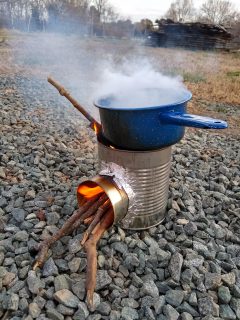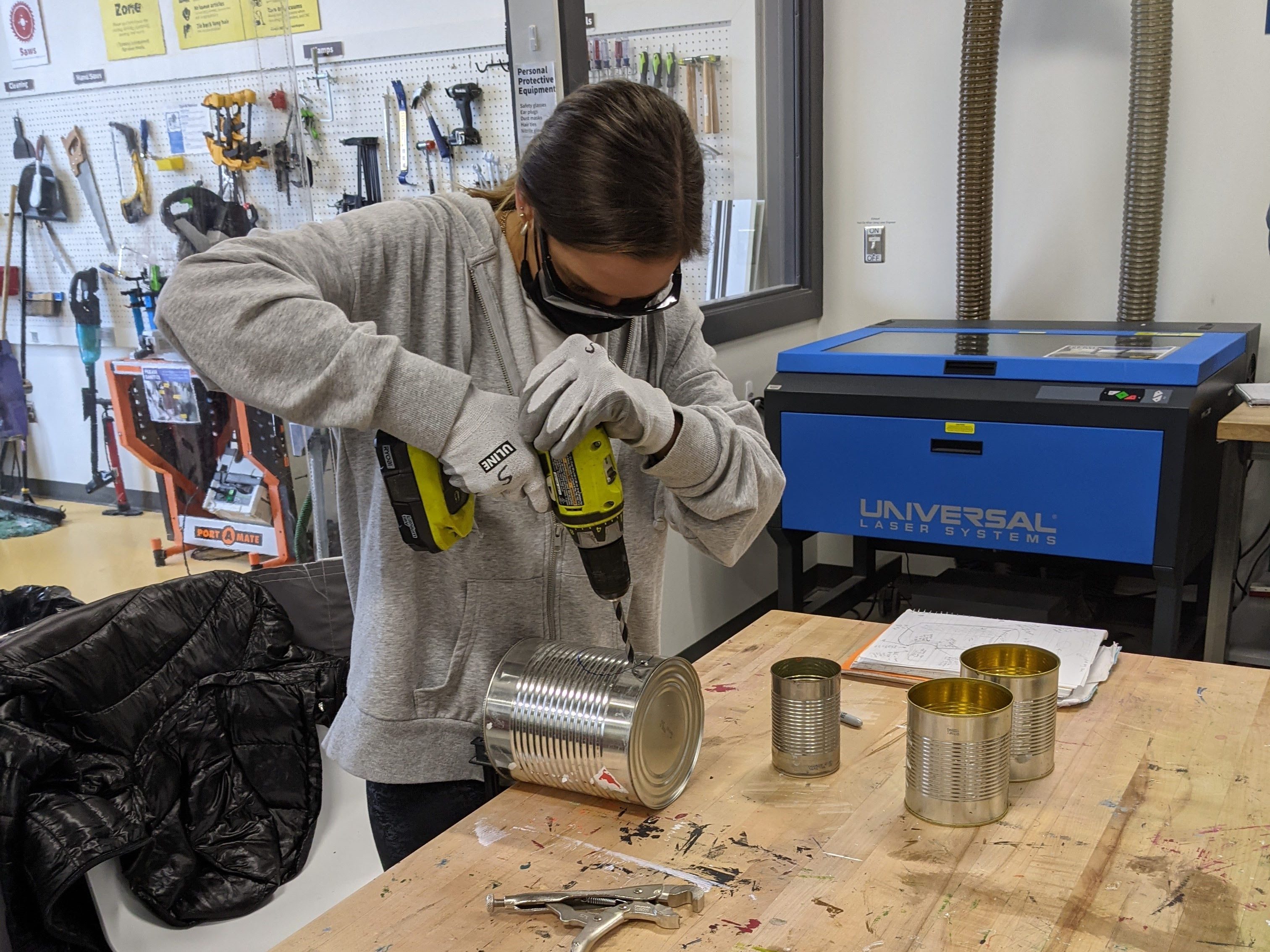Discover some of the many experiential learning opportunities available to students in Elon's makerspaces.
Winter Term is a popular time for class projects in the Maker Hub. This past January, three Elon courses combined academics, innovation and creation as they took on three unique projects at the Hub. Learn more about each project and consider the many experiential learning opportunities available to students in your course.
Environmental Science

Environmental Studies Lecturer Jacob Rutz teaches the concept of complete combustion through innovation in his course, Current Issues in Environmental Science. At the Maker Hub, he and his students sought to design and build a rudimentary rocket stove, a basic home wood-powered cooking stove, that utilizes best practices in combustion technology. Students built simplified versions of this product using materials from the Maker Hub, recycled cans from Elon dining and various insulation materials.

Lastly, students put their designs to the test by building small fires within the stoves with fallen twigs and sticks in an attempt to boil water. This project encouraged students to apply what they learned during class lectures about the variables and conditions that enable complete combustion and why it’s essentially the safest and most energy-efficient way to burn something.
Students came to the Maker Hub with basic blueprints of their stoves. Maker Hub consultants helped students realize their ideas.
“I think many students were initially overwhelmed by the requirements to both design and build this project in just seven days during J-term,” Rutz said. “The timeline was definitely tight, but I think that is some of the fun and rigor of J-term. Once students got going, most found it wasn’t quite as hard as they expected. Many underestimated the importance of incorporating good design principles versus emulating a design they found online, which was common. Those who integrated the design concepts had exceptional results, such as boiled water, cleaner burns, etc.”

It was an assignment that extended learning beyond academics as students applied content and learned new skills at the Maker Hub.
“Integrating key design principles into these simplified stoves is not easy, especially for many students who got to use power tools for the first time,” Rutz said. “But in that regard, it is absolutely worth taking the time and energy to give students of all backgrounds the chance to use new tools that yield immediate results.”
Now, Rutz is considering ways to get more of his students involved with the Maker Hub, including those in his agriculture classes who he’d like to explore design tools that could help make Loy Farm more efficient.
Math & Art
Crista Arangala, professor of mathematics and chair of the Department of Mathematics, and students in her Art Through Math course studied dimensionality and the concept of infinity during Winter Term. Students learned about two artists, M.C. Escher and Yayoi Kusama and read Edwin A. Abbott’s book “Flatland,” which is about a 2D world. In the book, the main character, Mr. Square, describes his discovery of multiple dimensions. In relation to the story, Arangala assigned a project to encourage students to visit the Maker Hub and create an art piece and description depicting Mr. Square’s discovery through the artistic lenses of Escher or Kusama.
Students first attended a 3D printer training, then began using Maker Hub resources to start design their projects.
“Students had free reign of what they could create,” Arangala said. “Many used the idea of mirrors from Kusama to build mirror boxes at the Maker Hub, while others used the 3D printer to print pieces of their art.”
Maker Hub Consultants were available to advise and inspire students, as needed. At the end of the term, the pieces were highlighted in a class exhibition.
“Students really enjoyed this project,” Arangala said. “Many of them had never been to the Maker Hub. The project really tapped into their creative spirit and nicely tied to our class discussions.
Arangala hopes to use the Maker Hub again for future class assignments.
Paths Inquiry Arts & Sciences

First-year Elon College Fellows had the opportunity to explore the Maker Hub and the Maker Mindset in January as a part of their Paths Inquiry Arts and Sciences course.
The Elon College Fellows program requires students to complete a two-year research project in the Arts and Sciences. In the course, Assistant Professor of English Heather Lindenman introduces students to resources before they begin their research.
To encourage students to explore, Maker Hub consultants highlighted some of the ways in which Elon students have incorporated the makerspace into their undergraduate research. In addition, students attended an orientation to introduce them to the Maker Hub and its machines and materials and also projects that were created using them. Next, to help spark their creativity, students explored hands-on by selecting a mini-project to complete, which included making a facemask, soldering a flip light, 3D printing an object, building a fairy-light lantern, folding origami or designing a snow globe.

Finally, students shared their projects with peers in order to spark inspiration through collaboration. The session ended with students reflecting components of the Maker Mindset — attitudes towards learning that are helpful when building something — that were relevant to their experiences.
Each of these professors used the Maker Hub in exciting and creative ways as they combined academic content and hands-on learning to extend knowledge beyond the classroom’s four walls. To learn more about how the Maker Hub can help you add experiential learning to your course, visit the Maker Hub website and schedule a consultation.



